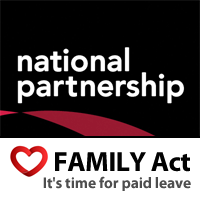Most Americans have no access to paid leave when babies are born or serious personal or family medical needs arise, but that will change when Congress passes the Family And Medical Insurance Leave (FAMILY) Act. This badly needed legislation was introduced for the first time today by Senator Kirsten Gillibrand (D – N.Y.) and Representative Rosa DeLauro (D – Conn.). It would establish a national paid family and medical leave insurance program, bringing the country’s employment safeguards in line with the needs of its workforce and with the rest of the world.
“No legislation would do more to make this a family friendly nation than the FAMILY Act. It is simply unacceptable that millions of Americans work hard every day, yet are one birth, accident or illness away from financial devastation because our public policies fail to provide paid leave,” said Debra L. Ness, president of the National Partnership for Women & Families. The National Partnership wrote and led the effort to pass the Family and Medical Leave Act of 1993 (FMLA), which is the only federal law designed to help people manage job and family. The organization is now leading the more than 415-group coalition pushing for the FAMILY Act. “The FMLA was a great first step, but it cannot be the last – especially as the nation faces a tsunami of elder care needs. With the FAMILY Act, Congress can fulfill the promise of the FMLA and better meet the needs of working families, employers and our economy.”
Just 12 percent of U.S. workers have paid family leave through their employers, and fewer than 40 percent have paid medical leave through an employer-provided temporary disability program. Of the 188 countries for which data are available, the United States is one of just seven that do not guarantee paid maternity leave. For the past 20 years, the FMLA has guaranteed unpaid leave and job protection for serious family and medical reasons. But, despite the law’s success, the most common reason cited by those who are eligible for FMLA leave but do not take it is that they cannot afford to do so.
The FAMILY Act would solve that by creating a new, self-sustaining fund to ensure employees can earn a portion of their wages for up to 12 weeks (or 60 workdays) to address their own serious health issue, including pregnancy and childbirth; to deal with the serious health issue of a parent, spouse, domestic partner or child; to care for a newborn or newly adopted child; and/or for specific military-related purposes. It would be funded through employee and employer contributions of about $1.50 per week each for a median wage worker in the United States. The program is modeled on similar programs in California and New Jersey; Rhode Island will soon have a paid family leave program as well.
Nationally, the type of program the FAMILY Act would establish has the support of business owners and the public. According to a Small Business Majority poll, more small employers say they support paid family and medical leave insurance than oppose it. And a 2012 election poll commissioned by the National Partnership found that 86 percent of voters – including 96 percent of Democrats, 87 percent of independents and 73 percent of Republicans – believe it is important for Congress and the president to consider a family and medical leave insurance system.
“It is time for the country to adopt a paid family and medical leave program. We must end the days when people lose a paycheck or a job because they have a baby, get seriously ill or have a loved one who needs care,” Ness continued. “We are urging Congress to build upon the FMLA and give hardworking Americans the support they urgently need. The FAMILY Act is based on successful paid leave insurance programs, and it has widespread support. Its passage should be a high priority for all federal lawmakers.”
To take action on the FAMILY Act, visit National Partnership’s action center and send a letter of support to your representatives in Congress.
More To Read
July 19, 2024
What do Washingtonians really think about taxes?
Most people understand that the rich need to pay their share
July 18, 2024
Protect Washington’s Kids by Protecting the Capital Gains Tax
Vote NO on I-2109 to keep funding for public education and childcare
July 15, 2024
It’s too expensive to get sick – it’s time to protect Washington patients
The extraordinary cost of medical debt.

